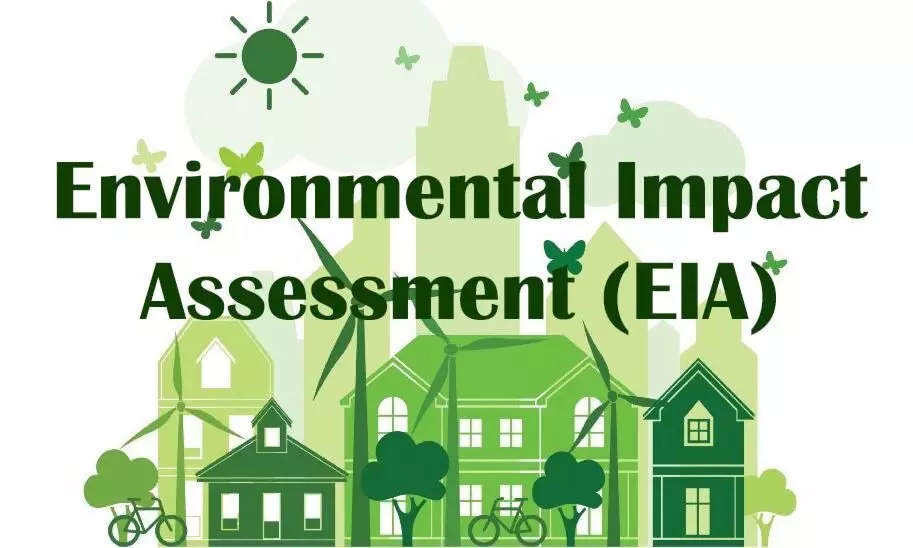
This EIA spells doom
text_fieldsToday is the deadline for the public to register their comments and complaints about the draft Environment Impact Assessment (EIA), prepared by the central ministry of forest and environment. In the closing hours before the deadline, social media is bustling with a virulent campaign demanding the withdrawal of the EIA in its current form on the grounds that the new notification will only serve to let the remaining natural resources of the country be looted by the regime's favourites and corporates. The ministry has received lakhs of protest letters by now. Although the new notification has a heading 'Environment Impact Assessment', none of the specifics in the document reflects anything of its spirit; on the contrary, it is replete with loopholes for sanctioning even large projects without an assessment of environmental impact. If such project areas as densely populated, authorities will have a much easier path for evicting them than was the case earlier.
In other words, EIA 2020 does raise a threat to the safe existence of nature and its human component of human lives. This is not unknown to the central government. Hence the release of the notification in a hushed manner on the day preceding the declaration of nationwide lockdown. The government in all probability has been in an attempt to allow only limited time for the public to make interventions by mobilising public opinion, and to that end made it a fast-tracked document. It was only after a subsequent intervention by the Delhi High Court that the time limit for responses was extended to this day. The notification, which should have been made available in all the major languages of the country, was published only in English and Hindi. And at the eleventh hour of comments and protests having stiffened by that ime, the government is trying to save its face by making a specious argument that this is only a document.
Environment regulations have been formulated in India, as it is in most countries, with the objective of creating sustained development models in tune with nature and without causing major damage to the environment. Governments have been pushed to this philosophy mainly by the environmental challenges raised by the dams built during the 1970s and the toxic gas accident of 1984 in Bhopal. In the 1990s, environment policies were expanded further in line with inernational laws. That was how, following the Rio accord, the government released the first notification for environmental impact. The implication of this was that when a new development project is initiated, it will be preceded by a study of the environment, its socio-economic and health implications, and the work should start only in compliance with the remedies recommended in the study. In 2006, the first UPA government introduced a new notification with amendments. Although this was fraught with several loopholes, it was possible to put an end to unbridled exploitation of nature. The Modi government has now come out with a new notification in order to amend this notification. In an atmosphere when signs of global warming and climate change are all too tangible, there is little doubt about the need for amendments, provided that regulations so devised should be able to solve the environmental problems created by the new world situation. But what happened here is just its opposite. For, the central minister Prakash Javadeker and his team have deprived EIA of its very spirit by diluting the previous law. As per the new draft, many classes of projects do not require environment impact assessment at all; and if the government views a project as 'strategic' then it is no questions asked, i.e. no public consultation is required; so is it with defence and security-related constructions.
The draft also provides that in industrial zones alone, including pharmaceutical units, over 70 types of projects do not need environment clearance. In mining sector too, corporates stand to enjoy major concessions. As per the earlier notification, EIA was a pre-requisite for mining over five hectares of mining lease area, which has now been changed to 100 hectares. And mining below that ceiling will require only the approval of state authority. The case of construction industry is similar to this. Earlier, buildings with an area more than 20,000 square metres were under EIA requirement, but the new draft stipulates that buildings smaller than 1.5 lakh square metres do not require it. Such a large structure may be required only for projects like airports. A translation of this is that in Kerala for example, no conceivable building will need EIA clearance. The case of cement production units, acid plants, synthetic rubber production and rural transport is no different. The government has closed the door for public to intervene in these areas. Even in sectors that need public consultation, the period for hearing is limited to 20 days from now on. The people around will be informed only at the time of land acquisition or, as it happened in the case of Bhopal and Vishakhapatnam, only when they become victim of disasters. It is against this appeasement of corporates by the fascist regime that protests are thickening in the country. Also reason why it becomes incumbent on every one to be in solidarity with this struggle for the survival of man and nature.























